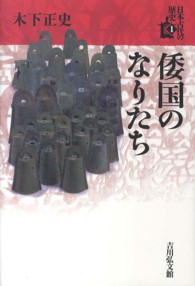- ホーム
- > 洋書
- > 英文書
- > Philosophy
Full Description
Through a radical new reading of the 'Theological Political Treatise', Dimitris Vardoulakis argues that the major source of Spinoza's materialism is the Epicurean tradition that re-emerges in modernity when manuscripts by Epicurus and Lucretius are rediscovered. This reconsideration of Spinoza's political project, set within a historical context, lays the ground for an alternative genealogy of materialism. Central to this new reading of Spinoza are the theory of practical judgment (understood as the calculation of utility) and its implications for a theory of democracy that is resolutely positioned against authority.
Contents
Preface
Introduction: Why is Spinoza an Epicurean?
Freedom as Overcoming the Fear of Death: The Dialectic of Authority and Utility in the Preface
The Power of Error: Moses, the Prophets and the People
Philonomianism: Law and Origin of Finitude
Political Monism: The Primacy of Utility over Authority
Love Your Friend as Yourself: The Neighbor and the Politics of Biblical Hermeneutics
The Freedom to Philosophise: The Two Paths to Virtue
Fear and Power: Natural Right and Authorisation in Spinoza and Hobbes
Theocracy: On the State of Authority
The Authority to Abrogate: The Two Paths to Virtue and the Internal Enemy
Conclusion: The Limitation of Spinoza's Epicureanism








